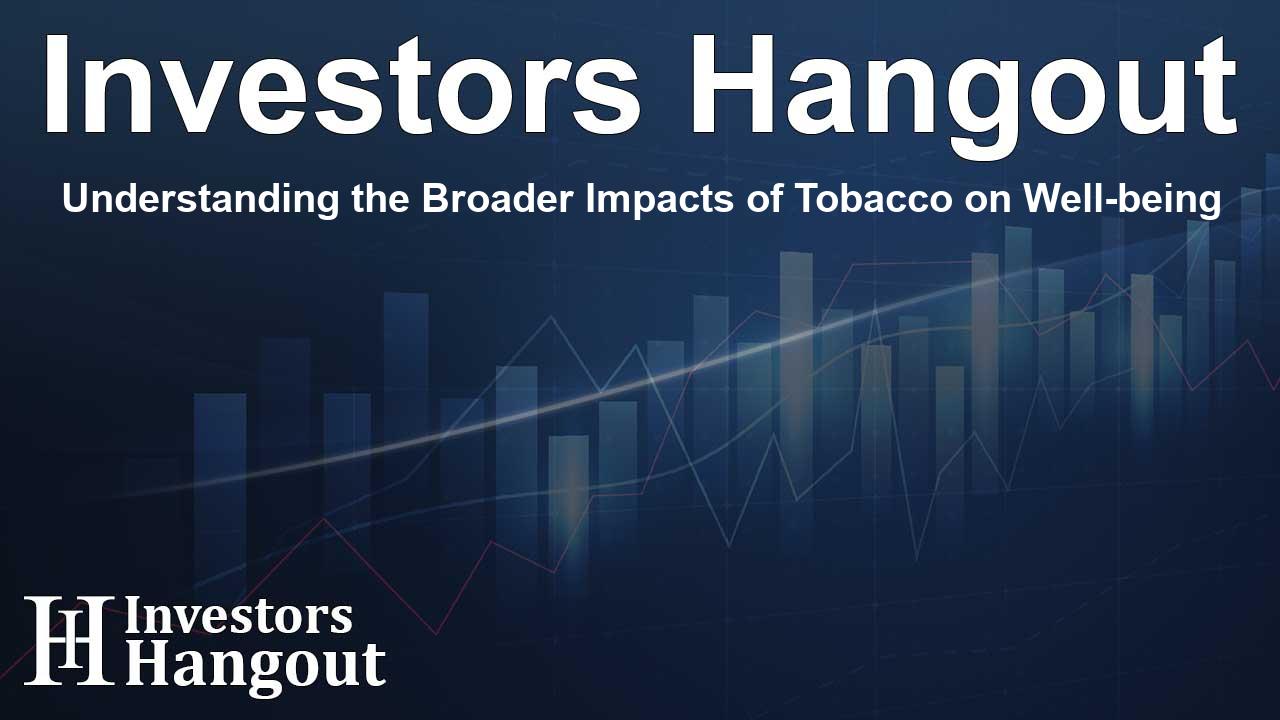Understanding the Broader Impacts of Tobacco on Well-being

The Far-reaching Effects of Tobacco Usage
Recent findings illuminate that tobacco usage extends beyond mere physical health concerns, affecting mental and financial wellness significantly. A substantial 58% of tobacco users express that it negatively impacts their overall well-being, prompting many to seek workplace benefits for cessation support.
Tobacco Use Among Working Americans
According to a significant report from The Guardian Life Insurance Company of America, nearly a third of working Americans continue to use tobacco products. This study, which emphasizes the vital connection between tobacco use and overall well-being, showcases that while the harmful physical repercussions of tobacco are widely recognized, the implications for mental and financial health might surprise many.
Mental Health Implications
The emotional repercussions of tobacco use are noteworthy. Only 36% of tobacco users report their emotional health as "excellent" or "very good," a figure noticeably lower than the 42% reported by non-users. This stark contrast suggests a troubling link between tobacco consumption and diminished mental wellness.
Financial Wellness Dilemmas
In addition to mental health issues, a significant 63% of Americans acknowledge that tobacco use has adversely impacted their financial health. This illustrates the broader economic strain caused by tobacco dependence, which can lead to expensive healthcare costs and loss of productivity in the workplace.
The Rise of Tobacco Use Among Younger Generations
Guardian's report takes a deeper look at the patterns of tobacco use among younger demographics, particularly Gen Z and millennials. Interestingly, e-cigarettes have emerged as the preferred tobacco product, with 67% of Gen Z respondents indicating these devices as their choice.
Health Risks of Tobacco Products
The consumption of any tobacco product, including e-cigarettes, can have adverse effects on oral health. Users often experience issues like stained teeth and halitosis, alongside severe concerns such as gum disease and potential cancer risks. Interestingly, many young users might not fully grasp the long-term repercussions of their choices until symptoms begin to surface.
Challenges in Quitting Tobacco
Despite the strong desire to quit—70% of tobacco users express a wish to stop—numerous hurdles remain. The report outlines that 57% of these individuals find quitting to be a significant challenge. Specifically, 40% of users want to quit immediately and seek support, heightened among those with dependents.
Employer Support for Cessation Programs
Workplace benefits play a crucial role in supporting employees in their tobacco cessation efforts. A notable two-thirds of users indicated interest in a no-cost cessation program provided through their dental insurer, underscoring the need for more employer-provided resources.
Guardian's Innovative Solutions
In a pioneering move, Guardian has become the first dental insurer to offer a comprehensive tobacco cessation program as part of their benefits package. In partnership with Pelago, Guardian provides members and their dependent children aged 15 and older access to dedicated care coaches, digital tracking tools, and necessary therapies for nicotine dependence.
Promoting Oral Health in Children
Guardian promotes oral health among younger individuals through initiatives like the Early Smiles™ program, which provides 100% coverage for preventive and essential care for children up to age 12. This initiative is designed to empower families in prioritizing dental wellness, further linking the importance of maintaining good oral health from a young age.
Conclusion
The findings from Guardian underscore the importance of understanding the multifaceted impacts of tobacco usage. With rising rates among younger generations, it is crucial for both individuals and employers to recognize the repercussions and explore supportive measures for cessation. By fostering awareness and access to programs, the path towards improved mental, financial, and physical health can become more attainable for many.
Frequently Asked Questions
What are the main findings of Guardian's report on tobacco usage?
The report reveals that tobacco usage negatively impacts mental and financial health, with many users seeking workplace support to quit.
How does tobacco usage affect financial wellness?
A significant portion of tobacco users, 63%, report adverse effects on their financial health due to increased healthcare costs and lost productivity.
What percentage of tobacco users want to quit?
About 70% of tobacco users express a desire to quit, with many facing challenges in achieving this goal.
What support is available for quitting tobacco?
Many employers are now offering no-cost tobacco cessation programs, making it easier for employees to seek help in quitting.
How is Guardian supporting oral health in children?
Guardian's Early Smiles™ program provides comprehensive dental care coverage for children up to 12, promoting early oral health practices.
About Investors Hangout
Investors Hangout is a leading online stock forum for financial discussion and learning, offering a wide range of free tools and resources. It draws in traders of all levels, who exchange market knowledge, investigate trading tactics, and keep an eye on industry developments in real time. Featuring financial articles, stock message boards, quotes, charts, company profiles, and live news updates. Through cooperative learning and a wealth of informational resources, it helps users from novices creating their first portfolios to experts honing their techniques. Join Investors Hangout today: https://investorshangout.com/
Disclaimer: The content of this article is solely for general informational purposes only; it does not represent legal, financial, or investment advice. Investors Hangout does not offer financial advice; the author is not a licensed financial advisor. Consult a qualified advisor before making any financial or investment decisions based on this article. The author's interpretation of publicly available data shapes the opinions presented here; as a result, they should not be taken as advice to purchase, sell, or hold any securities mentioned or any other investments. The author does not guarantee the accuracy, completeness, or timeliness of any material, providing it "as is." Information and market conditions may change; past performance is not indicative of future outcomes. If any of the material offered here is inaccurate, please contact us for corrections.